Action Over Adversity: The SDF Youth Hub’s Work in Gaza
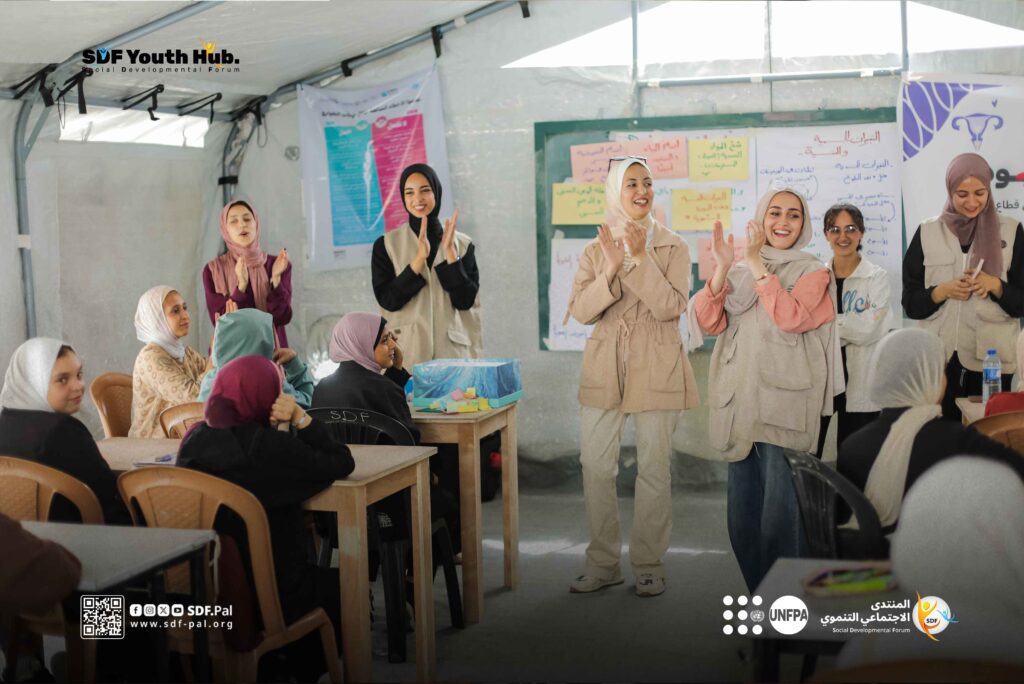
In the heart of the Gaza Strip, where the impact of the ongoing genocide has been weighing heavily on youth for over two years, the SDF Youth Hub continues to drive forward with its activities. Despite immense challenges, the Hub has been serving as a sanctuary for learning, creativity, and empowerment.
Amidst the sounds of shelling and severe shortages of basic services, the Hub members’efforts to counter sexual and reproductive health have emerged as a crucial line of defense. This work aims to protect adolescents and girls from heightened risks of abuse, particularly within the harsh reality of displacement in makeshift tents, while paving pathways to awareness and psycho-social recovery.
Through a project implemented by the Social Development Forum in partnership with the United Nations Population Fund (UNFPA), the youth team carried out a range of specialized and intensive training. These sessions covered essential topics such as protection from sexual exploitation, reproductive health awareness, and Psychological First Aid (PFA), tailored for both young men and women.
Beyond the training, the team took to the field, visiting displacement camps across northern Gaza and Gaza City, to deliver dozens of peer-led educational workshops. These sessions aimed to deepen public awareness of the specific hardships faced by girls and women, and to mitigate the severe compounded effects of displacement. The initiative continues to expand, bringing tangible support and vital knowledge to an ever-growing number of youth, adolescents, and families in need.
Safeguarding Our Youth: Specialized PSEA Training for Adolescents
A major milestone was the implementation of a Training of Trainers (ToT) on Protection from Sexual Exploitation and Abuse (PSEA), delivered in partnership with the “Sanad” network and supported by UNICEF.
The training engaged 20 male and female volunteers from the Youth Hub. Half of them were adolescents (15-18 years), a demographic directly targeted for the first time in this context, while the other half were youth (19-22 years).
Over two intensive days, participants engaged in practical discussions and practical simulations covering: core definitions of exploitation, abuse, and harassment; the six core principles of PSEA; socio-economic, environmental, and technological risk factors; reporting mechanisms and the victim-centered approach; the evolving context of the genocide in Gaza; and how local institutions have been addressing the issue.

“The training posed a remarkable nature due to the varied age range of participants, spanning 16 to 20 years. The sensitivity of the topics also made the task more focused and multilayered,” said Khalid Hamdan, the lead trainer.
He added, “Despite the novelty of the concepts and the current circumstances, participants have demonstrated a remarkable capacity to grasp the material and recognize its importance. They have shown a genuine desire to utilise this new knowledge to protect their community. The outcomes were notably positive, participant engagement was clearly visible, and they successfully absorbed the content, acquiring knowledge satisfyingly and effectively .”
“The Hub Shop”: Redefining Reproductive Health Awareness
From another angle, the “Hub Shop” initiative was launched as a creative space for producing diverse awareness materials on issues of reproductive health, life skills, and active civic participation.
The team transformed the initiative into a visual and informational hub, offering youth and adolescents access to brochures and posters designed with a contemporary artistic touch and accessible language. A dedicated corner within the Hub was set up to display and share these materials, creating a dynamic space for continuous learning and knowledge exchange.
Implemented over four days across multiple locations, including the SDF’s headquarters, schools, and shelters in Gaza City, the initiative engaged 15 youth volunteers from the SDF’s Youth Network. They distributed 2,500 informational brochures to displaced community members on a range of relevant topics. Building on this success, the team is now preparing to launch the second phase of the initiative.

Psychological First Aid: Empowering a Generation to Support One Another
Amid the immense psychological pressures Gazans face, the Hub implemented an expanded Psychological First Aid (PFA) training for 20 young men and women (aged 18 to 26) from Gaza City, northern Gaza, and Deir Al-Balah.
Over 30 training hours, participants gained essential skills in: understanding the impact of Gaza’s crises on mental health; providing individual and group support; active listening and supportive communication; managing psychological emergencies and building resilience; and safe referral and follow-up mechanisms to ensure quality intervention.
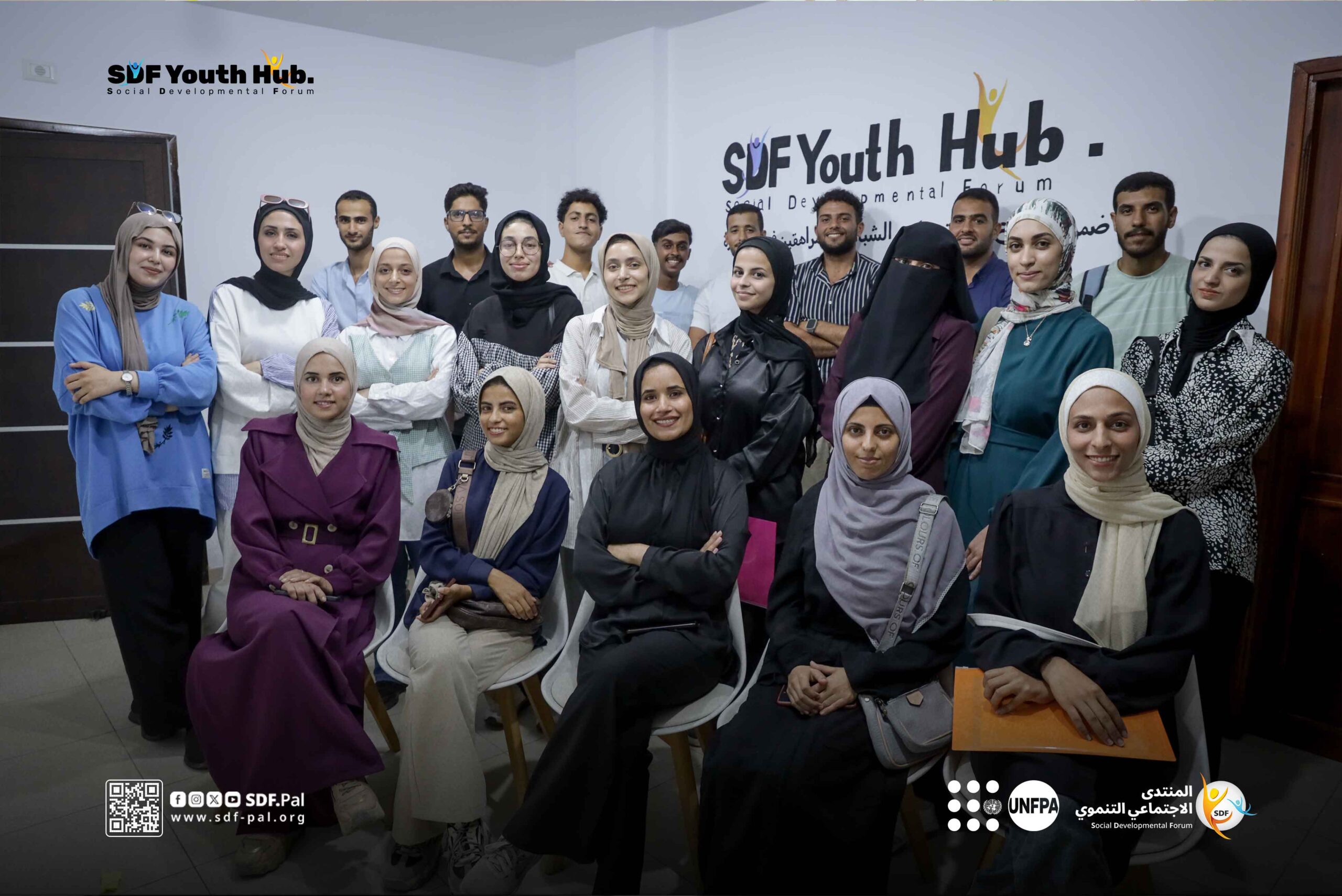 Women to Women Awareness Workshops
Women to Women Awareness Workshops
Throughout the final months of the project, the team implemented over 25 awareness workshops under the “The Girls’ Tent Initiative” targeting girls, women, adolescents, and young women. These sessions addressed vital topics affecting their lives amid displacement and immense hardship.
The workshops, led by young female leaders from the Hub following intensive “peer education” training, covered reproductive and sexual health, pregnancy and breastfeeding, personal hygiene and public health, and other marginalized issues.
Sessions like “You Are Not Alone” addressed gender-based violence, while “Early Awareness Against Early Marriage” and “Early Marriage Equals a Postponed Dream” aimed to combat forced marriage. Others, including “Pretty” and “Hygiene is Essential, Even in the Hardest Conditions,” reinforced personal hygiene concepts and practices to confront sexual violence.
The workshops targeted girls aged 12 to 18 across various locations in Gaza City and Northern Gaza, including shelters, schools, displacement camps, and SDF’s learning spaces..
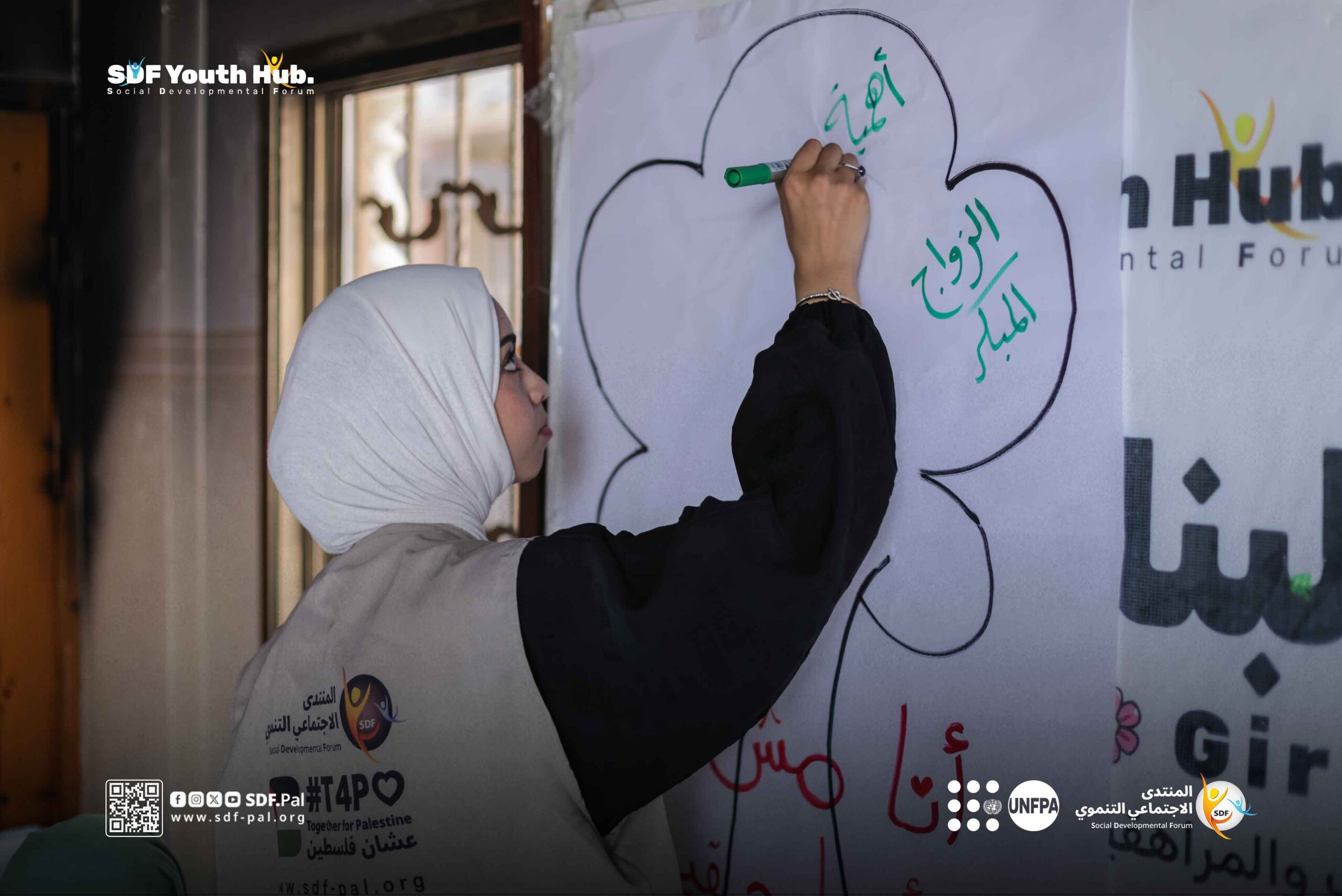
Before the sessions, 20 young women participated in four days of training to build their skills in facilitation, interactive education, and providing knowledge support to girls simply and safely. These workshops evolved beyond learning sessions into platforms for open discussion, breaking barriers of silence and fear, and fostering intergenerational exchange of experiences.
The enthusiasm the young women brought was palpable. They received substantial preparation and support from the SDF, including extended intensive training at the Youth Hub.
The positive feedback after my session ‘Hygiene is Essential, Even in the Hardest Conditions’ was an unforgettable motivation. I felt how many people are eager for awareness and change, and how a single word can leave an impact. The engagement gave me energy and confirmed that every effort can be the beginning of a real difference.
Razan Abu Hameeda, a 25-year-old workshop facilitator from the Hub
Youthful Spirit, Unbroken Resolve
Despite genocide and the siege, the Hub’s youth have proven that willpower is stronger than restrictions, and that knowledge can be the first line of defense for rights, health, and dignity.
Reflecting on his experience training the Hub’s members, Ahmed Murtaja, one of the lead trainers who worked closely with the youth, stated:
“We didn’t have much: limited time, scarce resources, and a path full of obstacles. But we had enough to begin. In just a few hours of training, we established skills in peer education and community initiative leadership, then invited participants to return to their neighbourhood, their tent, their space, to try. They came back to us with ideas, and we developed them together into tangible actions that create change.”
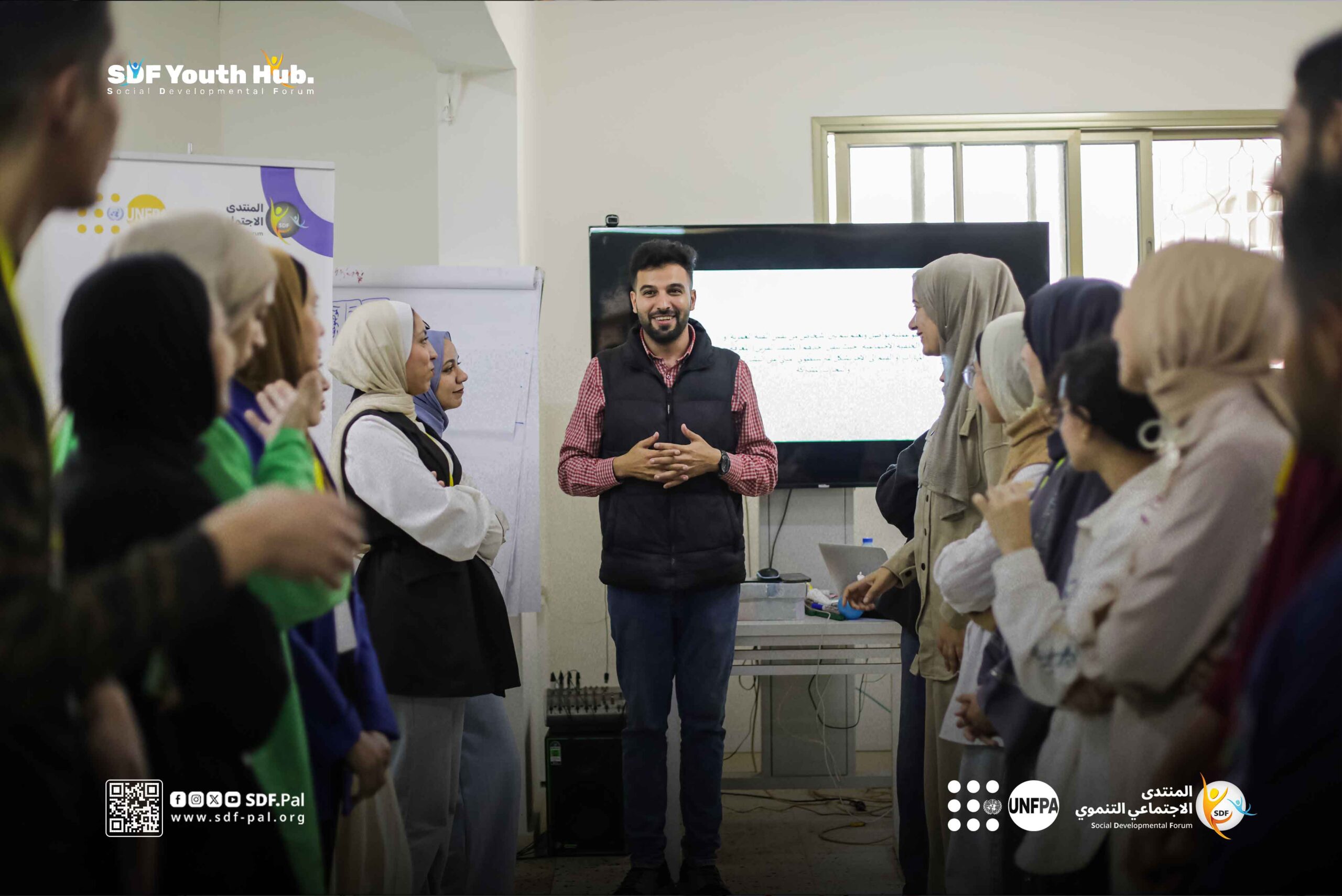
He continued: “The youth organized learning sessions and set up a girls’ tent as a space to learn, speak without fear, and find a safe language for their questions. They launched community initiatives that brought a touch of hope to a bitter reality. The situation revealed a severe lack of safe spaces during long months of genocide, the scarcity of programs working with youth, and the immense difficulty of providing even basic hospitality and essentials.”
Murtaja added: “Our recommendations were clear: start with PFA support spaces, maintain regular youth-led sessions with facilitator follow-up, and embed skills in dialogue, facilitation, and humanitarian response into the core of every initiative. Only then did the SDF’s safe spaces become a sustained community practice.”
Youth Leading the Way
In my daily follow-up with the youth, I witness their stories and experiences under displacement and genocide. Despite the harsh reality surrounding them, I find inspiration in their ability to persevere and challenge circumstances.
Yasmin Muhanna, Coordinator of the Youth Hub
Yasmin speaks passionately about what she observes, adding: “They haven’t settled for mere survival; they’ve stepped up to lead community initiatives that meet the needs of their families and communities. They’ve organized awareness activities in displacement camps, carrying positive messages about health, rights, and awareness. They also approach training with an eagerness for knowledge, gaining new skills and passing them on to their peers, creating wider circles of hope and impact.”
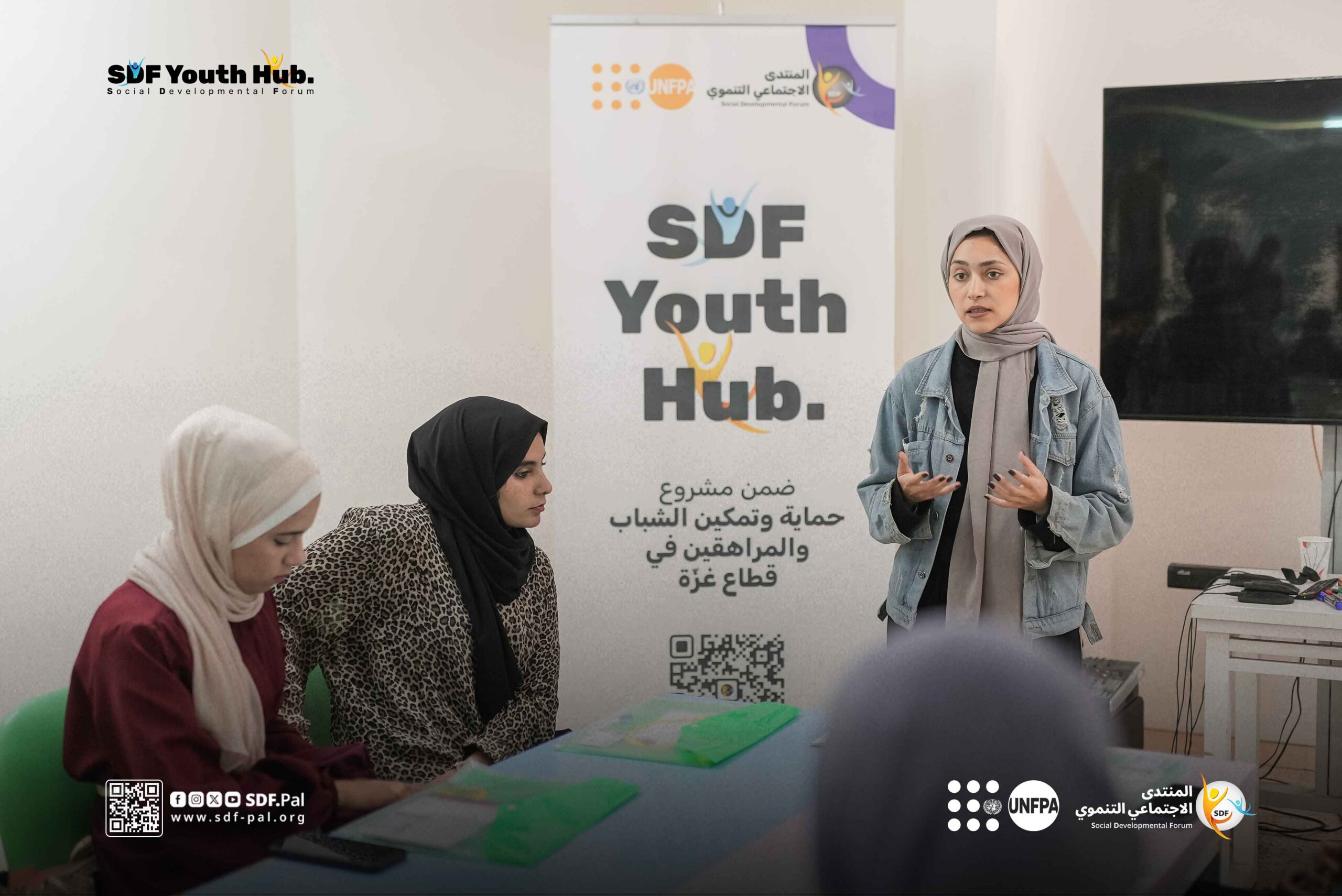
“I envision real leaders in them, not just beneficiaries, but partners in building and changing,” She reflects. “And honestly, whenever the weight of reality feels heavy, I draw strength and determination from them. They are my daily source of inspiration, living proof that we can overcome the harshest conditions and shape a more just and dignified future.”
The journey is long, but every step counts
Though the young leaders are fully aware of the long road ahead, after a genocide that burned every detail of their lives, big and small, from homes and streets to institutions, buildings, and memories, and though they know rebuilding all this will take years, only if an immense political will exists, they also know they hold something else in their hands.
The Hub’s youth believe in change. They believe that rebuilding awareness, minds, and hope is no less vital than rebuilding the blocks that once formed everything they knew. That is why they persist. With every initiative, every workshop, every activity and new idea, they strive daily to revitalize something the genocide has broken and to offer hope to someone in Gaza.


